The Best 5 Hydrolyzed Protein Cat Food: Benefits, Reviews, and Ingredient Analysis
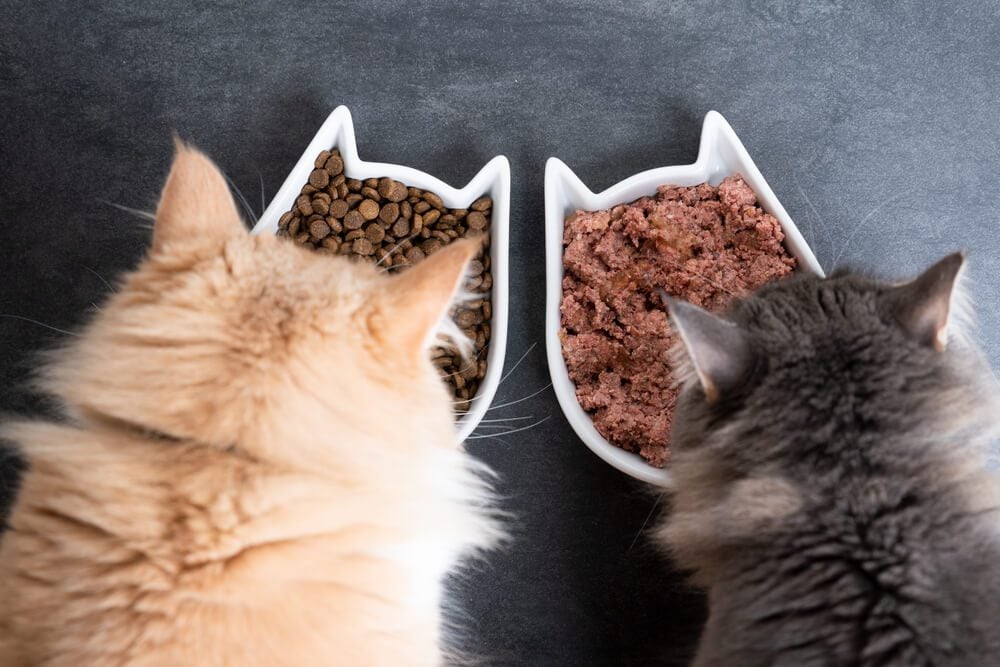
Table of Contents
What is the Best Hydrolyzed Protein Cat Food?
| Image | Product | Features | Price |
|---|---|---|---|
Our Top Pick 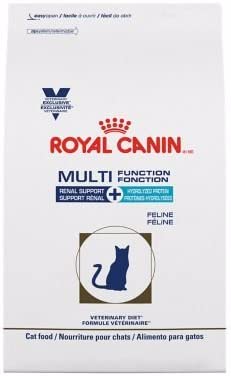 | A highly palatable energy-dense formula in the form of crunchy and aromatic kibble. | Get on Amazon | |
Most Popular 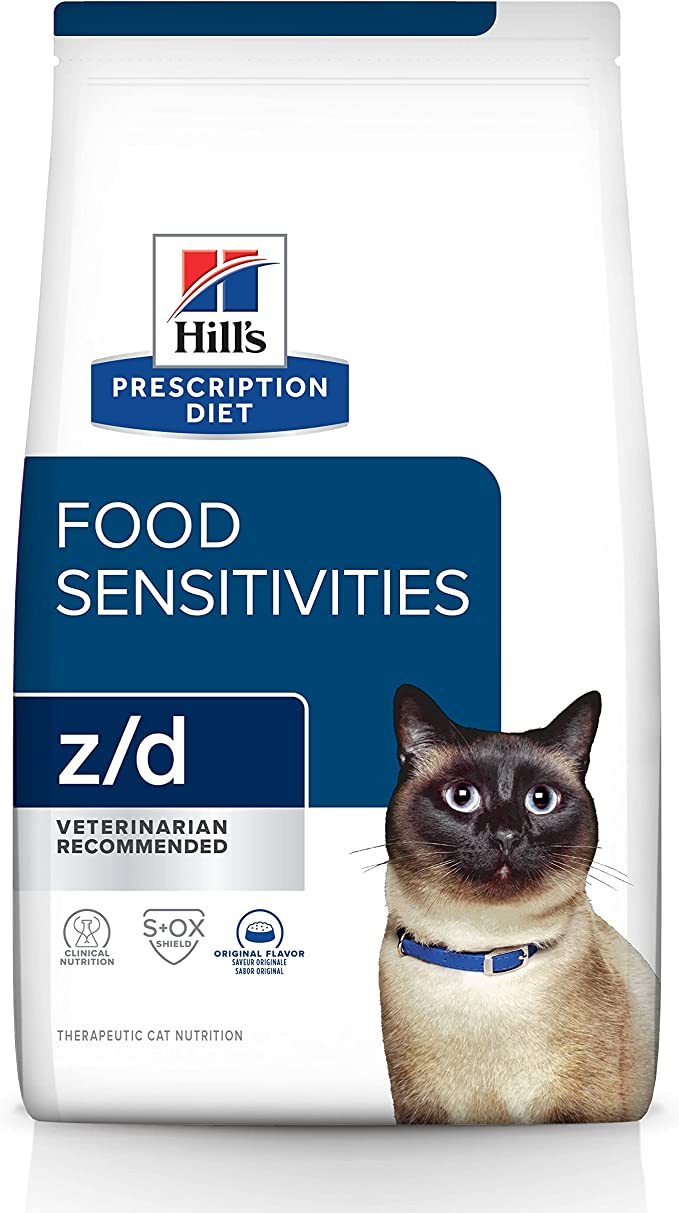 | With over 500 reviews on Amazon, this is the most popular hydrolyzed cat food. | Get on AmazonGet on Chewy | |
Best Fine Ingredients 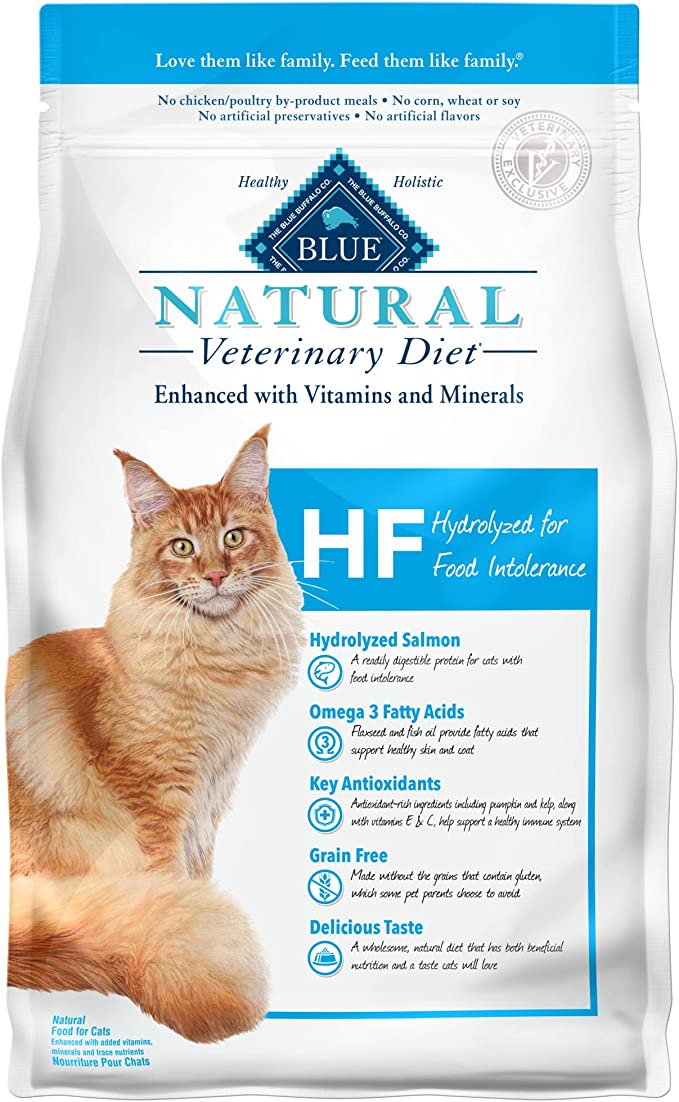 | Grain-free recipe with hydrolyzed salmon enhanced with vitamins and minerals. | Get on AmazonGet on Chewy | |
Most Affordable 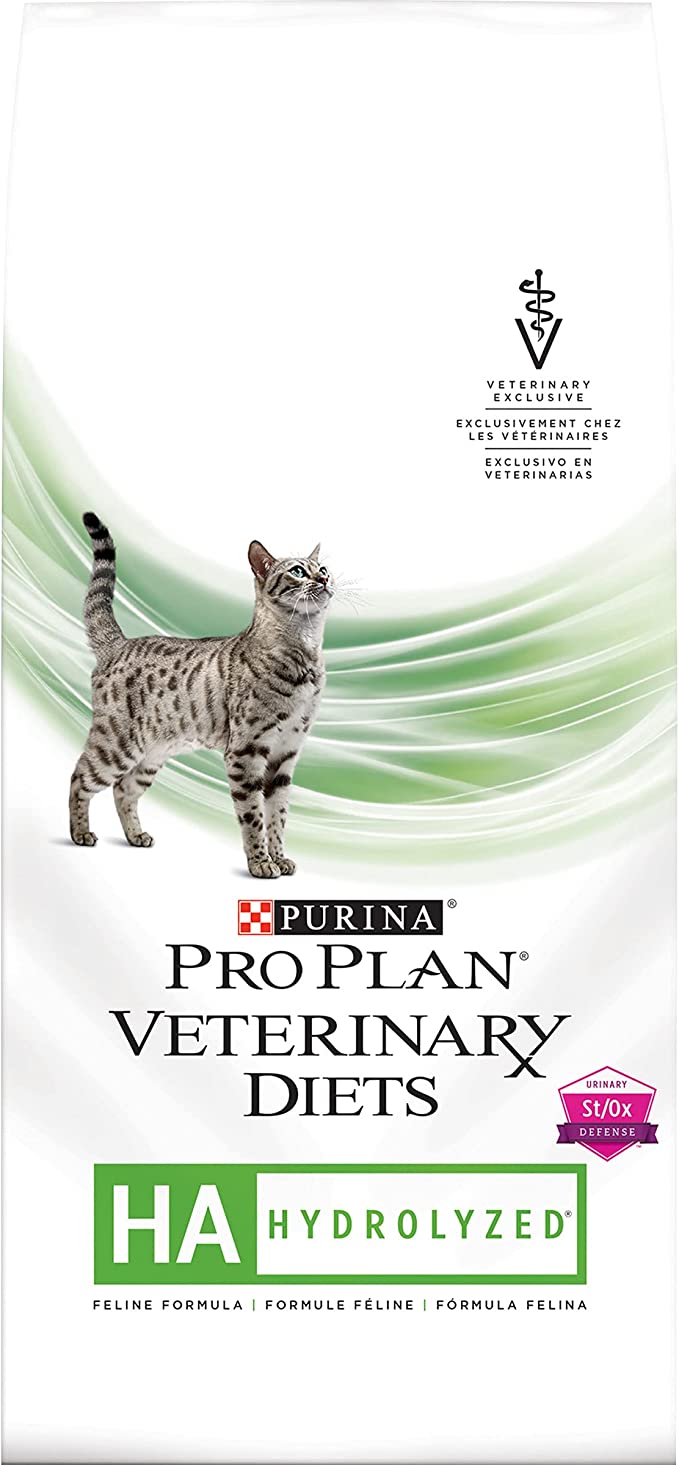 | At $7.75 per pound, this is the most affordable hydrolyzed protein food for sensitive cats. | Get on AmazonGet on Chewy | |
Best Hypoallergenic 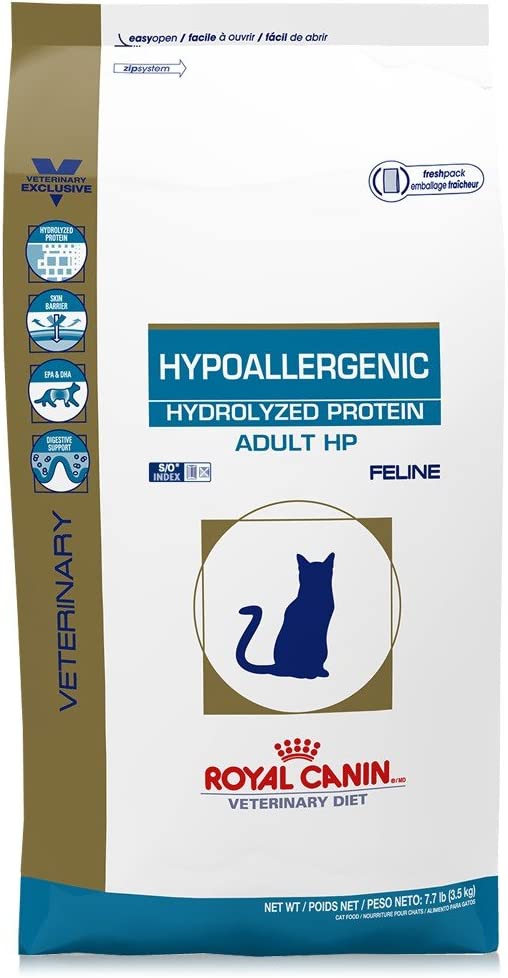 | Easily digestible soy-based cat food formula fortified with omega fatty and amino acids. | Get on Amazon |
What is Hydrolyzed Protein Cat Food?
Hydrolyzed protein cat food is a specific type of pet food made with hydrolyzed proteins – proteins that are broken down into smaller pieces. These protein pieces are too small for the immune system and can easily escape its radar.
Why Would a Cat Need Hydrolyzed Protein?
A cat would need hydrolyzed protein cat food if it has food allergies or food intolerances.
Allergic reactions occur when the immune system flags certain particles as foreign. In the case of food allergies, the immune system recognizes certain proteins as allergens.
As explained, in hydrolyzed protein cat food, the proteins are too small, and their presence cannot be registered by the cat’s immune system. Therefore, hydrolyzed protein foods are perfect for cats with adverse food reactions.
Is Hydrolyzed Protein Cat Food Good for Cats?
Yes, hydrolyzed protein cat food is good.
There are several benefits of using hydrolyzed cat food. Those include:
- No Adverse Food Reactions. Obviously, using hydrolyzed protein food will prevent adverse food reactions and help manage cats with food sensitivities and allergies. Such foods are also an important part of the treatment of cats with inflammatory bowel disease (IBD).
- Easy Digestion. Since the proteins are already hydrolyzed or broken down into smaller pieces, the hydrolyzed protein cat food is easy to digest. This helps prevent placing extra pressure on the gastrointestinal tract and reduces the risk of cat diarrhea and vomiting in cats.
- Improved Skin Health. Food allergies and sensitivities have a direct impact on the cat’s skin and coat health – most allergic reactions cause skin lesions and infections. Therefore, it is safe to assume that using hydrolyzed protein food helps support healthy skin and coat.
The Best Hydrolyzed Protein Cat Food Reviewed
There are different hydrolyzed protein cat food options on the market. Before deciding on a cat formula, read our thorough review of some of the best-hydrolyzed protein cat diets.

Summary: The Royal Canin Hydrolyzed Protein Adult is an extremely palatable and calorie-dense dry cat food with aromatic kibble that entices the cat’s appetite. The formula is unlikely to trigger skin and gastrointestinal tract reactions. Plus, it promotes healthy kidney function as it is very low in phosphorus and rich in antioxidants and fish oil fatty acids (EPA & DHA). The food is available in a 6.6-pound bag.
Type: Dry cat food
Best for: Adult cats with food sensitivities
Price: $28.00/lb
- Tasty & energy-dense formula
- Reduces the risk of skin and GI reactions
- Rich in antioxidants and omega-3 fatty acids
- Phosphorus-low for kidney & urinary health
- Aromatic, appetite-stimulating kibble
- Requires a veterinary prescription
- Very expensive price tag
Ingredient Analysis: Brewer’s rice and hydrolyzed soy protein are the first two ingredients, this may not be ideal for a cat who requires animal protein to survive. Chicken fat is added for animal content along with fish oil, but they are the only two animal products in this food meant for carnivores. Micronutrients like choline chloride and taurine are added with vitamin supplements, however, which are great for healthy bodily function.
Review: While reviews are few in number, the highly-rated reviews express satisfaction with the quality of the product. Their cats seem to enjoy it, and their allergy symptoms were reduced or even completely irradicated with the use of this food. Critical reviews were bitter about the price and the seemingly unreasonable price increase on Amazon by some of the sellers.

Summary: This Hill’s Prescription Diet is formulated with highly hydrolyzed single animal protein & single carbohydrate sources. It is made to minimize the risk of adverse food reactions, improve the skin barrier and support healthy skin & coat. The food is also rich in natural dietary fiber for simple digestion and normal stool. The recipe comes in dry and wet cat food options. The dry food comes in 4 and 8.5-lb bags, and the wet foods come in 5.5-ounce packs of 24 cans.
Type: Dry cat food
Best for: Adult cats with food sensitivities
Price: $7.80/lb
- Veterinary-recommended cat food recipe
- Formulated to create a strong skin barrier
- Helps avoid adverse food reactions
- Single protein & single carbohydrate source
- Natural fiber for healthy digestion & stool
- Requires a veterinary prescription
- The first two ingredients are plant-based
Ingredient Analysis: Two of the first three ingredients are plant-based, which is not ideal. Hydrolyzed chicken liver is the second ingredient for its rich mineral and vitamin profile as well as its protein content, but rice protein is added to bump up the overall protein content. The micronutrients in this food are rich, however, with inclusions of manganese, folic acid, and potassium chloride.
Review: With over 500 reviews, 80% of which are five-star ratings, it seems like customers are largely happy with this cat food. The top review even claimed it “changed my life” and goes on to explain their cat had vomited nearly daily for 15 years. The vomiting stopped after introducing the cat to this food. One and two-star reviews were mostly annoyed with the fact their cat would not eat the food but left almost no other negative remarks.

Summary: Exclusively formulated for cats with food intolerances and sensitivities, this Blue Buffalo formula features delicious and hydrolyzed salmon as the first ingredients. The recipe includes other all-natural and premium-quality ingredients that ensure digestion, immunity, and skin & coat health. It comes in wet and dry food options. The dry cat food is packed in 7-lb bags, while the wet cat food is in 5.5-ounce cans.
Type: Dry cat food
Best for: Adult cats with food sensitivities
Price: $8.16/lb
- Formula that starts with hydrolyzed salmon
- Made with the finest natural ingredients
- Fortified with omega fatty acids & antioxidants
- No grains, by-products, and artificial additives
- Available in both wet and dry food types
- Requires a veterinary prescription
- Uses vegetable oil to round up the fat content
Ingredient Analysis: Hydrolyzed salmon is the first ingredient making this the only food on this list to have animal protein as the foundation of the formula. Vegetable oil is used for omega-6 fatty acids, but there are better choices for this nutrient in cat food. Essential nutrients like niacin, vitamin E, and calcium carbonate are added to complete this nutrient-dense cat food.
Review: Reviews on this product were mixed, with only 68% giving it a 5-star rating. Those who rated it highly were pleased with their cat’s enthusiasm when eating and because it cured their cat’s digestive distress. Critical reviews make up almost 20% of total reviews, and the chief complaint seems to be their cats won’t eat it. Some even say they “don’t blame” their cats for not wanting to eat the food based on the smell.

Summary: This Purina Pro Plan Veterinary diet is made with hydrolyzed soy protein isolate and rice starch to reduce the risk of adverse food reactions and food intolerances. To round up the protein sources, it also has hydrolyzed chicken and hydrolyzed chicken liver. Featuring a single carb source, the food is easily digestive and suitable for cats of all life stages. The hydrolyzed protein cat food is sold in 8-lb bags.
Type: Dry cat food
Best for: Food-sensitive cats of all ages
Price: $7.75/lb
- Hydrolyzed and high-quality protein sources
- Low crude fat content
- With a single carbohydrate source
- Delicious and suitable for cats of all life stages
- Slightly cheaper than other options on this list
- Requires a veterinary prescription
- Has a relatively low prebiotics
Ingredient Analysis: There are no animal ingredients in this food aside from chicken liver and hydrolyzed chicken which are fourth and sixth on the ingredients list, respectively. Rice starch is the first ingredient, followed by hydrolyzed soy protein isolate and vegetable oil preserved with TBHQ. The micronutrients are great with the inclusion of vitamin E, cellulose for fiber, and vitamin b12 supplements, but the primary ingredients seem to be made for herbivores.
Review: This product averages a 4-star rating but only has 62 ratings on Amazon. Of the few four and five-star reviews, there were people who had used it for their small dog as well as their cats, and both had said it helped with symptoms like diarrhea and hair loss. However, the critical reviews stated the food stopped working, and the quality of the product had taken a decline as their pet would no longer eat it.

Summary: This Royal Canin Veterinary Diet Feline Hypoallergenic formula is made using simple soy proteins that are unlikely to trigger adverse food reactions and allergies. This also prevents allergic lesions and skin problems. The Hydrolyzed Protein Adult HP recipe is enriched with fatty acids (EPA & DHA) and amino acids to strengthen the skin barrier. This easily digestible dry food comes in a 7.7-lb bag.
Type: Dry cat food
Best for: Adult cats with food sensitivities
Price: $8.00/lb
- Incorporates simple soy proteins
- Prevents allergic lesions and dermatitis
- Highly digestible with a low antigenic potential
- Fortifies with amino acid and omega fatty acids
- Comes in an easy-open, zip-system package
- Some cats dislike the flavorless kibble
- Requires a veterinary prescription
Ingredient Analysis: This food for carnivores has almost no animal products in it. Brewer’s rice and hydrolyzed soy protein are the first two ingredients. This indicates a higher carb content, and plant-based proteins are the foundation of this recipe. Chicken fat is third, which is good, but it seems to be the only notable animal ingredient in this food. Vegetable oil and fish oil help to add omega fatty acids, and trace minerals like sodium selenite and calcium iodate are supplemented alongside vitamins E, A, and B.
Review: The majority of the 120 reviews give this product a five-star review. Buyers were thankful their vet had recommended it and stated it improved their cat’s health. Almost 20% of the reviews, however, were one and two-stars. Critical reviewers were upset the food did not help their cat’s symptoms, their cat wouldn’t eat, or made claims that the ingredients were not all included in the bag.
What Should I Look for in Hydrolyzed Protein Cat Food?
When shopping for hydrolyzed protein cat food, pet parents need to pay attention to the following factors:
- Single Protein Source. The reasons for needing hydrolyzed protein are such that it requires a limited number of protein sources to avoid being a trigger for allergic reactions. This means a hydrolyzed protein cat food should be part of a high protein diet by only providing one single source of animal protein.
- Limited Ingredient Food. If a cat is allergic to a protein, it may be allergic to other foods as well. Common allergens like corn and most grains as well as a few additives will not be in a limited ingredient cat food. Simply put, the fewer ingredients in the food, the less likely it is to cause allergies.
- Novel Proteins. Often times food intolerance comes from sensitivity to common proteins like beef, chicken, dairy products, and fish. To avoid this, some brands use novel proteins, which are unusual animal sources like venison, duck, and lamb. However, they still need to be hydrolyzed to escape the cat’s immune system.
- Helps stimulate appetite in cats and encourage eating with aromatic kibble
- Helps reduce the risk of skin and GI reactions with proteins that are broken down to a size that’s less likely to be recognized by the immune system
- Helps compensate for decreased appetite with a highly palatable energy-dense formula to reduce meal volume
What Ingredients Should Not be in Hydrolyzed Protein Cat Food?
Certain ingredients should not be found in a high-quality hydrolyzed protein cat food. The list of such ingredients includes:
- Grains. Most hydrolyzed protein cat foods are grain-free. This is because grains are likely to cause allergic reactions in sensitive cats.
- Common Proteins. Common proteins such as chicken, beef, and fish will often not be found in a hydrolyzed protein cat food because of their allergenic nature.
- Meat By-Products. By-products are low-quality ingredients that do not add nutritional value to the formula. Plus, they are known as allergens.
- Artificial Additives. In addition to being hazardous, artificial additives such as preservatives, colors, and flavors can act as allergens and trigger an allergic reaction.



















